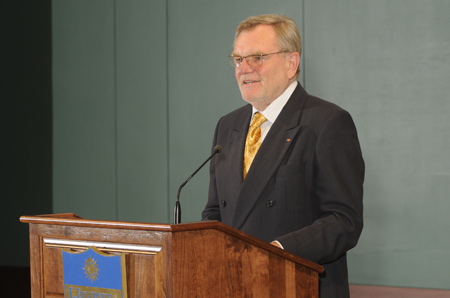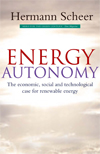Media Coverage
![]() Interview by Franz Alt with Dr. Hermann Scheer on the long way to IRENA, July 2009
Interview by Franz Alt with Dr. Hermann Scheer on the long way to IRENA, July 2009
What has been your motivation to launch the idea to establish an International Renewable Energy Agency?
My initiative was motivated by the paradox of the existing gigantic potential of renewable energy on the one hand and its complete underestimation on the global, regional and national level on the other. Renewables are undervalued in spite of their fundamental benefits: the fact that they are inexhaustible, that they can be produced without CO2 emissions and that they can create energy autonomy everywhere. Conventional energy experts from the scientific, economic and therefore also from the political sphere collectively underestimated renewable energy. Faced with the dangers that the nuclear and fossil energy supply present to our natural environment together with the increasing dependence of a growing number of countries on limited reserves of oil, gas, coal and uranium, this dualism of gigantic potential and complete underestimation appeared to be life threatening to our global civilisation – from an ecologic as well as an economic point of view.
PARIS — In Sharm el Sheik, Egypt, delegates from 79 countries will meet next month to choose a home, a director and a preliminary work program for the International Renewable Energy Agency, which was set up this year to lead a global drive to accelerate and expand the development of renewable energy resources.
The agency grew out of a conference in Bonn on Jan. 26, which was sponsored by the German government, with support from Denmark and Spain. Of the 192 United Nations member states invited, 125 sent delegations and 75 European and emerging countries signed on to the final agreement establishing the agency, also known as Irena.
Since January, four more countries have joined, most recently Mauritania. Membership includes leading European economies like Germany and France; emerging economies like India; major energy producers like Norway and Nigeria; hostile neighbors like Eritrea and Ethiopia, or Israel and Syria; and poor states like Liberia and Burkina Faso.
The United States has not yet joined the agency because of lingering commercial concerns, but is likely to do so, Hermann Scheer, a member of the Bundestag, the lower house of the German Parliament, said during an interview.You'll find the complete article here.
 Hermann Scheer Promotes Real Opportunities and Economic Benefits of Renewable Energies
Hermann Scheer Promotes Real Opportunities and Economic Benefits of Renewable Energies On 8 May 2009 he spoke to germany.info on a visit to Washington DC about renewable energy as a solution to the global economic crisis, and about his vision for IRENA, the newly founded International Renewable Energy Agency
Germany.info: You’ve just been awarded the 2009 Karl Böer Solar Energy Medal of Merit by the University of Delaware. In your acceptance speech you said "our world is at a turning point." What did you mean by that?
Hermann Scheer: We are faced with three world crises. Today all speak about the financial crisis. This is a global economic crisis, no doubt. And at the same time we have the climate crisis. And at the same time we have the resources crisis. And it will become impossible to overcome these crises with separate measures....
You'll find the complete interview here

Eulogy to Hermann Scheer, Winner of the 2009 Karl W. Böer Solar Energy Medal of Merit, awarded on May 7, 2009, University of Delaware
The presentation of the ‘Laudatio’ to Hermann Scheer today is not only a great honour for me but indeed a personal pleasure and satisfaction as I am connected in friendship since many years with both Hermann Scheer, the awardee, and with the sponsor of this Solar Energy Medal of Merit, Karl Wolfgang Böer.
Wolfgang Böer, originally Professor of Physics in Germany, the land in which physical science benefits of high prestige in society, is known there as a hero who rebuilt, virtually from scratch, the Physical Institute at the Humboldt University in Berlin from the ruins of WW II. Article published in PV-Magazine, January 2009. By Britta Danger.
Article published in PV-Magazine, January 2009. By Britta Danger.
At the end of January, the International Renewable Energy Agency (IRENA) is to be founded. Its goal is to ramp up alternative energy sources worldwide. Over the past year, preparatory conferences have taken place.
Hermann Scheer smokes one cigarette after the other. Yet again, his fellow members of the Social Democratic Party in Germany are feuding. Scheer wants to make his position known in a protest letter. Under extreme time pressure, he is writing the note to the comrades in his office at the German parliament in Berlin. At the same time he makes sure that the press is informed so that the impact is greater.
Now, he can finally take a breather. His next job has a scope much greater than the political infighting within the SPD. The goal is nothing less than the founding of an international agency for renewables – something that would shake up the global energy market for the long term. As Scheer puts it: “This German initiative is our contribution to global development.”
You can read the whole article here.
 An interview with Hermann Scheer on the establishment the International Renewable Energy Agency (IRENA) was published on Sunday, 25 January 2009, in Kankyo Business.
An interview with Hermann Scheer on the establishment the International Renewable Energy Agency (IRENA) was published on Sunday, 25 January 2009, in Kankyo Business.
 Interview published in The Toronto Star, December 18, 2008 by Tyler Hamilton
Interview published in The Toronto Star, December 18, 2008 by Tyler Hamilton
'Calls combo of wind, hydroelectric power `absolutely perfect'
Ontario could power itself exclusively on renewable energy one day if it thought differently about the operation and design of its entire electricity system, says the chief architect of Germany's green-energy law.
German legislator Hermann Scheer, largely credited for pushing through the policies that have turned his country into a renewable-energy powerhouse, said the biggest challenge is overcoming the belief that large, centralized power plants based on nuclear fission and fossil fuels are necessary for an electricity system to operate reliably.



